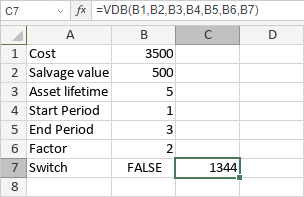VDB Function
The VDB function is one of the financial functions. It is used to calculate the depreciation of an asset for a specified or partial accounting period using the variable declining balance method.
The VDB function syntax is:
VDB(cost, salvage, life, start-period, end-period[, [[factor][, [no-switch-flag]]]]])
where
cost is the cost of the asset.
salvage is the salvage value of the asset at the end of its lifetime.
life is the total number of the periods within the asset lifetime.
start-period is a starting period you wish to calculate depreciation for. The value must be expressed in the same units as life.
end-period is an ending period you wish to calculate depreciation for. The value must be expressed in the same units as life.
factor is the rate at which the balance declines. It is an optional argument. If it is omitted, the function will assume factor to be 2.
no-switch-flag is the optional argument that specifies whether to use straight-line depreciation when depreciation is greater than the declining balance calculation. If it is set to FALSE or omitted, the function uses the straight-line depreciation method. If it is set to TRUE, the function uses the declining balance method.
Note: all the numeric values must be positive numbers.
The values can be entered manually or included into the cell you make reference to.
To apply the VDB function,
- select the cell where you wish to display the result,
-
click the Insert function icon situated at the top toolbar,
or right-click within a selected cell and select the Insert Function option from the menu,
or click the icon situated at the formula bar,
- select the Financial function group from the list,
- click the VDB function,
- enter the required arguments separating them by commas,
- press the Enter button.
The result will be displayed in the selected cell.

Alla pagina precedente